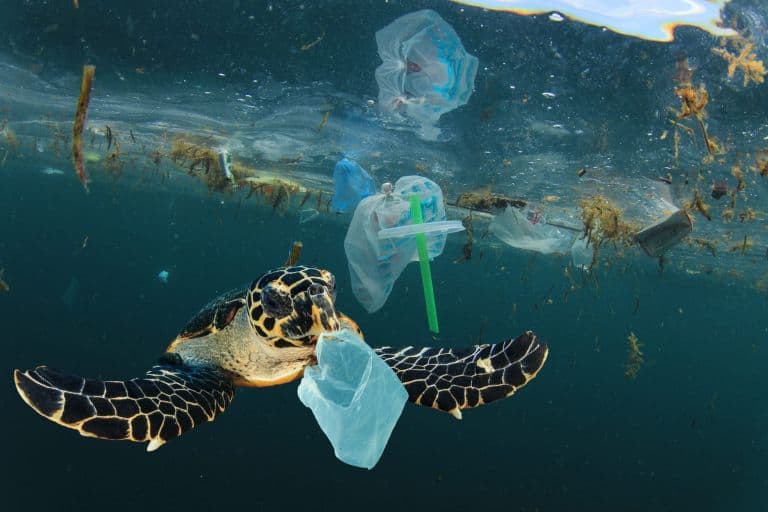The Environmental Challenge with Traditional Wet Wipes
The widespread usage of conventional wet wipes in everyday hygiene and cleaning practices has raised environmental concerns due to their composition and disposal challenges.
1. Non-Biodegradable Materials:
Composition: The majority of traditional wet wipes are composed of synthetic fibers like polyester and polypropylene. These materials are plastic and are not biodegradable. This results in a notable rise in landfill trash since these wipes persist for hundreds of years post-disposal.
Impact: If these wet wipes are flushed down toilets by accident, they do not break down like toilet paper and may lead to obstructions in sewage systems, known as ‘fatbergs’. Furthermore, once they enter the natural habitat, they may be misidentified as food by animals, resulting in consumption that might be lethal.
2. Chemical Pollution:
Hazardous Substances: Wet wipes are often infused with a range of chemicals such as preservatives, perfumes, and disinfectants. These compounds may harm the environment if the wipes are not disposed of correctly.
Impact: Chemicals may seep into soil and water bodies, impacting plant and animal life. Chemicals may be harmful to aquatic life by altering reproductive systems and causing a loss in biodiversity.
3. Resource Intensive Manufacturing:
Water and Energy Use: The manufacturing of traditional wet wipes is resource-intensive, requiring substantial quantities of water and electricity. Processing and bleaching the fibers require energy and may result in the emission of hazardous chemicals.
Impact: The extensive resource use increases the items’ ecological footprints. Energy use, especially from non-renewable sources, contributes to the total greenhouse gas emissions, worsening global warming.
4. Packaging Issues:
Non-Recyclable Materials: Wet wipes are usually enclosed in non-biodegradable or recyclable plastic containers or wrappers. This contributes to the plastic waste issue since the packaging materials often wind up in landfills or as litter in natural environments.
Impact: Plastic packaging’s long-lasting presence in the environment leads to pollution and threatens animals and ecosystems. Moreover, the manufacturing of these polymers requires additional resources and energy use.
These challenges emphasize the immediate need for implementing more sustainable procedures in the manufacturing and usage of wet wipes. To tackle these difficulties, innovation in product creation, changes in consumer behavior, and regulatory methods are necessary to ensure appropriate disposal and minimize environmental repercussions.
Eco-Friendly Materials in Wet Wipes
Wet wipes manufacturers are shifting to sustainable materials to provide eco-friendly alternatives as knowledge of the environmental effects of standard wet wipes increases. The eco-friendly materials are created to reduce environmental impact by using renewable sources, biodegradable components, and fewer chemicals.
1. Bamboo Fiber:
Sustainability: Bamboo is very sustainable because of its rapid growth, natural regeneration without replanting, and minimum use of pesticides and fertilizers. It may increase in length by one meter within a day.
Properties and Benefits: Bamboo fiber has inherent antibacterial and hypoallergenic properties, making it ideal for those with sensitive skin. It is very absorbent and sturdy, providing exceptional durability and comfort. Bamboo fibers are completely biodegradable, decomposing rapidly when composted, and therefore have a far lesser environmental impact compared to manufactured products.
2. Organic Cotton:
Sustainability: Organic cotton is cultivated without hazardous pesticides or synthetic fertilizers, resulting in a reduced environmental footprint compared to conventional cotton. It depends on natural mechanisms like crop rotation to preserve soil fertility.
Properties and Benefits: Organic cotton is very soft, making it perfect for personal care, particularly for newborns or those with sensitive skin. It is both renewable and completely biodegradable. Cotton fibers provide a soothing and non-irritating cleaning option that is effective without the environmental impact of synthetic wipes.
3. Cellulose from Wood Pulp:
Sustainability: Cellulose produced from wood pulp is usually obtained from forests maintained sustainably. Wet wipes manufacturers often use FSC-certified wood to guarantee that their goods promote ethical forestry management practices.
Properties and Benefits: Cellulose fibers are natural, plant-derived materials known for their great absorbency. A good substitute for plastic-based fibers, providing similar strength and cleaning properties. Wood pulp is fully biodegradable and compostable, leading to a substantial reduction in landfill trash.
4. Tencel (Lyocell):
Sustainability: Tencel, also known as Lyocell, is a sustainable fabric derived from the wood pulp of trees cultivated on dedicated tree farms. The product is made utilizing sustainable solvents that are recyclable and environmentally friendly.
Properties and Benefits: Tencel fibers include softness, and breathability, and are 50% more absorbent than cotton, making them very useful for wet wipes. They are both biodegradable and compostable. Tencel is produced using a closed-loop manufacturing method that minimizes byproduct waste and reduces water and energy consumption in comparison to other fibers.
5. Polylactic Acid (PLA):
Sustainability: PLA is a bioplastic made from renewable materials such as maize starch or sugar cane. It biodegrades under industrial composting settings and has a lower carbon dioxide footprint compared to many other polymers in manufacture.
Properties and Benefits: PLA fibers are recognized for their rigidity and superior strength, making them advantageous for applications requiring increased durability. Although not as inherently soft as bamboo or cotton fibers, PLA may nonetheless provide efficient cleaning and is great for decreasing reliance on petroleum.
Consumers may greatly lessen their environmental footprint by selecting wet wipes manufactured from these eco-friendly wet wipes materials. Each material offers distinct advantages and demonstrates how product innovation may encourage more sustainable customer behavior. With the rising demand for eco-friendly goods, these eco-friendly wet wipes materials are expected to become more common in the market, encouraging the sector to adopt more sustainable methods.
Innovative Brands Leading the Charge
Some wet wipes manufacturers have become prominent in the eco-friendly wet wipes industry by introducing innovative sustainable methods and materials. Here are some pioneering firms making notable progress:
1. Bambo Nature:
Bambo Nature specializes in environmentally friendly infant care products, including wet wipes crafted from gentle and sustainable bamboo fibers.
The wet wipes are fully biodegradable and created to reduce environmental harm. The company has eco-certifications such as the Nordic Swan Ecolabel, showcasing its dedication to decreasing its carbon impact.
The wet wipes are devoid of parabens, fragrances, and hazardous chemicals, ensuring they are suitable for even the most delicate skin, such as babies.
2. Caboo:
Caboo specializes in manufacturing domestic paper goods using bamboo and sugarcane, which are both extremely renewable resources.
The wet wipes are crafted from bamboo and are biodegradable and compostable, showcasing sustainability practices. Caboo prioritizes minimizing tree consumption and avoiding the use of toxic chemicals in its manufacturing methods.
Caboo wipes provide hypoallergenic, chlorine-free, and BPA-free properties, appealing to customers seeking ecologically responsible and gentle solutions for their skin.
3. Natracare:
Natracare specializes in organic and natural personal care products, including wet wipes manufactured from organic cotton that are 100% biodegradable.
They only use organic and natural materials, completely avoiding synthetic chemicals. They have a manufacturing technique that aims to save water and energy, and they support ethical sourcing and labor rights.
Natracare’s wipes are certified organic, vegan-friendly, and supported by several environmental and ethical groups, such as the Soil Association.
4. Eco by Naty:
Eco by Naty specializes in environmentally friendly infant care products, including wet wipes crafted from 100% biodegradable plant-based materials.
Eco by Naty has led the way in including plant-based ingredients in its wipes, which has resulted in a substantial decrease in the usage of plastics.
The company’s goods have been approved by TÜV Austria and other eco-labels. The wet wipes are chemical-free, making them safe for infants’ skin and the environment.
5. The Cheeky Panda:
The Cheeky Panda utilizes bamboo to manufacture a range of eco-friendly items, such as wet wipes.
The wet wipes from The Cheeky Panda are crafted entirely from bamboo, a naturally regenerating material that does not need pesticides or fertilizers. Their goods are certified by the Forest Stewardship Council (FSC), guaranteeing responsible sourcing of bamboo.
The wipes are vegan-friendly, cruelty-free, and devoid of harmful chemicals, making them safe for all skin types and environmentally friendly.
These wet wipes manufacturers demonstrate how dedication to sustainability and ingenuity in product development may result in practical, environmentally friendly alternatives to conventional wet wipes. By endorsing these brands, customers contribute to a broader trend towards environmental stewardship and a more sustainable future.
Consumer Guide: Choosing the Right Eco-Friendly Wipes
Consumers must examine many criteria when buying eco-friendly wet wipes to ensure they reduce environmental effects while satisfying personal care demands. Here are important factors to remember:
1. Material Composition:
Biodegradability: Seek wet wipes composed of entirely biodegradable materials, including bamboo, organic cotton, or wood pulp. These materials decompose more rapidly and thoroughly compared to synthetic options.
Renewability: Give preference to materials obtained from renewable sources. For instance, bamboo grows rapidly and sustainably, making it a great option for environmentally friendly goods.
2. Chemical Composition:
Avoid Harmful Chemicals: Select wet wipes that are alcohol-free, paraben-free, sulfate-free, and do not include artificial scents. These substances may have deleterious effects on both the skin and the environment.
Natural Ingredients: Choose wet wipes with natural components like aloe vera, vitamin E, and essential oils for hydration and fragrance.
3. Certifications:
Organic Certifications: Seek organic certifications such as USDA Organic or the Soil Association to guarantee that the natural components are cultivated without hazardous chemicals.
Eco-labels: Eco-labels like FSC (Forest Stewardship Council) or TÜV Austria’s OK Compost mark signify that a product adheres to certain environmental criteria throughout its manufacturing and packaging processes.
4. Packaging:
Recyclable or Biodegradable Packaging: Recyclable or Biodegradable Product sustainability includes both the goods and their packaging. Select wet wipes packaged in recyclable or biodegradable materials to minimize plastic waste.
Minimal Packaging: Products with less packaging are favored due to their lower total trash generation.
5. Corporate Procedures:
Transparency: Wet wipes manufacturers that openly disclose their sourcing, production procedures, and operational ethics. This transparency often indicates a sincere dedication to sustainability.
Sustainability Commitments: Sustainability Consider whether the wet wipes manufacturers engage in environmental measures outside their product line, such as supporting forestry programs or using renewable energy in their manufacturing facilities.
6. Product Evaluations and Standing:
Customer Input: Consult reviews from other users to assess the efficacy and skin compatibility of the wet wipes, as well as the credibility of the company’s environmentally friendly assertions.
Brand Reputation: Investigate the wet wipes manufacturer’s reputation in terms of environmental and ethical activities. Wet wipes manufacturers that constantly show dedication to sustainability are more inclined to provide environmentally friendly goods.
7. Cost compared to Sustainability:
Price Factors: Although eco-friendly wet wipes may have a higher price tag than traditional choices, it’s important to weigh the overall environmental impact when deciding which to choose. Often, a somewhat greater price indicates superior quality and less environmental effect of the product.
Consumers may make educated decisions regarding eco-friendly wet wipes by considering these elements, which will correspond with their personal care requirements and environmental ideals, thus contributing to a more sustainable future.





